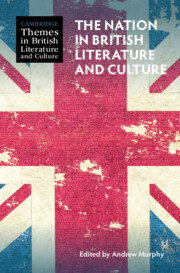Book contents
- The Nation in British Literature and Culture
- Cambridge Themes in British Literature and Culture
- The Nation in British Literature and Culture
- Copyright page
- Contents
- Contributors
- Acknowledgements
- Part I Origins
- Part II Writing the Nation
- Part III Revolutions and Empires
- Chapter 9 The American Revolution
- Chapter 10 The French Revolution
- Chapter 11 ‘And What Should They Know of England Who Only England Know?’
- Chapter 12 Rather Unpleasant Stories
- Chapter 13 Sun-Drowned Streets and Wasted Lives
- Part IV Making the Modern Nation
- Part V Futures
- Index
Chapter 9 - The American Revolution
from Part III - Revolutions and Empires
Published online by Cambridge University Press: 20 July 2023
- The Nation in British Literature and Culture
- Cambridge Themes in British Literature and Culture
- The Nation in British Literature and Culture
- Copyright page
- Contents
- Contributors
- Acknowledgements
- Part I Origins
- Part II Writing the Nation
- Part III Revolutions and Empires
- Chapter 9 The American Revolution
- Chapter 10 The French Revolution
- Chapter 11 ‘And What Should They Know of England Who Only England Know?’
- Chapter 12 Rather Unpleasant Stories
- Chapter 13 Sun-Drowned Streets and Wasted Lives
- Part IV Making the Modern Nation
- Part V Futures
- Index
Summary
Despite the dependence of the American colonies on London for their supply of books and their literary style in the eighteenth century, literature functioned as a crucial catalyst of revolutionary fervor and national identity in the 1770s. This mobilisation of radical republican sentiment occurred both in the realm of non-fiction prose (most famously through Thomas Paine’s pamphlet Common Sense) and in poetry, from irreverent ‘carrier addresses’ published in local newspapers to high-toned ‘satires of the times’. The career of African American poet Phillis Wheatley offers a poignant example of the way British literary prestige and pro-revolutionary political expression were at cross-purposes during the revolutionary period. Writers like Wheatley unsettle the dominant cultural nationalist paradigm of American literary history, which sees political independence paving the way for American literary and cultural independence by the mid-nineteenth century, and instead point towards alternative conceptions of freedom in the imperial Atlantic world.
- Type
- Chapter
- Information
- The Nation in British Literature and Culture , pp. 157 - 173Publisher: Cambridge University PressPrint publication year: 2023

